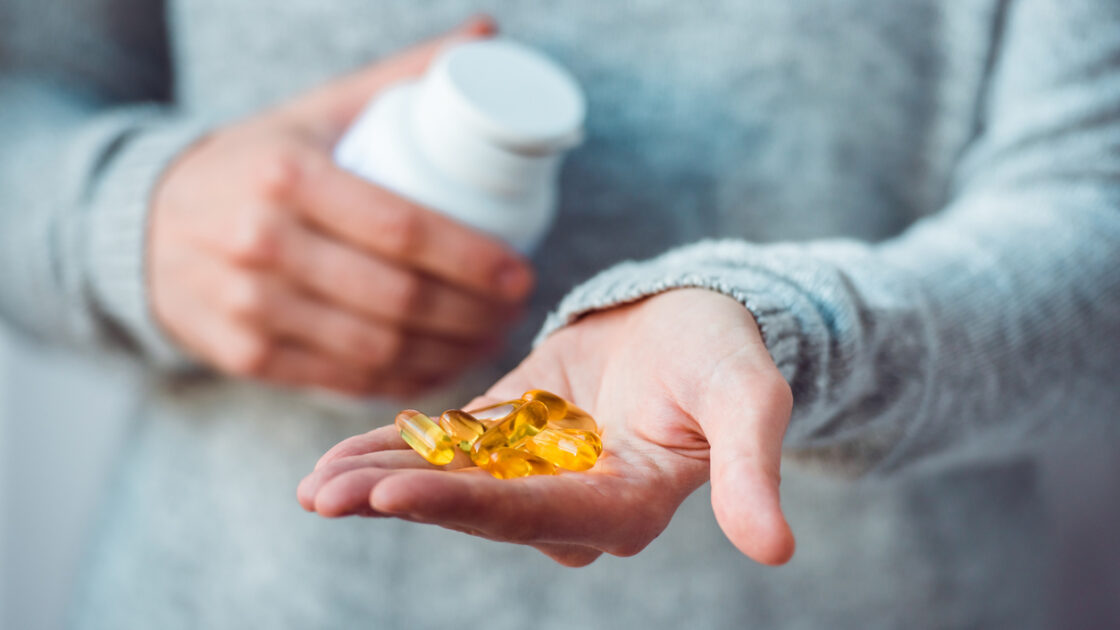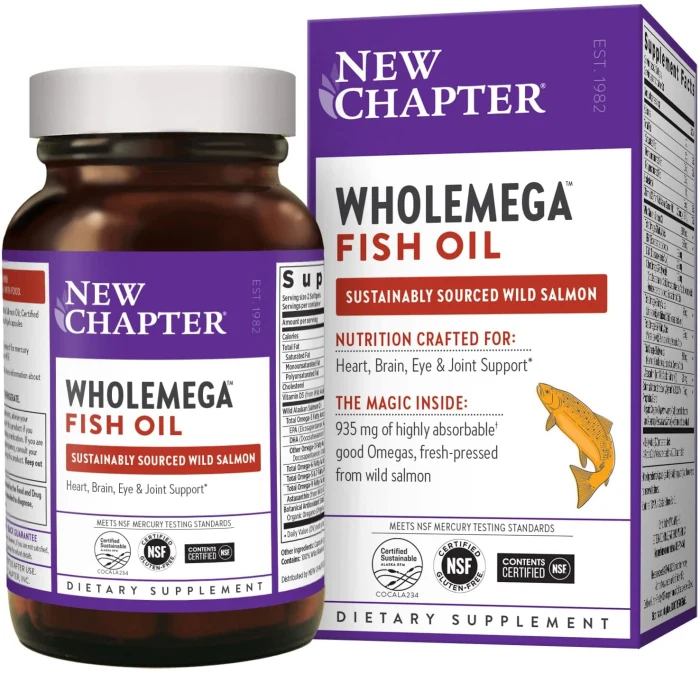These are the 3 Dietary Supplements Worth Taking on the Reg According to a Nutritionist
Keep expensive pee to a minimum by streamlining your supplement routine with these three dietary supplements experts say are actually worth it.

*Affiliate disclosure.
Look, we get it: Navigating the world of dietary supplements is overwhelming. Are daily multivitamins necessary? What’s a probiotic? And should you really be popping turmeric pills like everyone else?
Here’s the skinny: Although whole foods should be the first line of reaping vitamins, minerals, and other nutrients, some supplements can offer a serious boost to your health and wellbeing.
But before we dive in, a word of warning: You should always ask your doctor regarding taking new supplements and vitamins first, especially if taking certain medications – as misusing supplements can result in serious health issues.
And once you’ve gotten your doctor’s OK, do your research! Look for a product that has a third-party certification verifying the supplement’s quality, such as NSF International, Consumer Lab, or United States Pharmacopeia. Or, head to a reputable health food store (such as Whole Foods Market or Pharmaca) that has a knowledgeable practitioner or employee on staff, and ask for help.
With that in mind, as a nutritionist, these are three dietary supplements I highly recommend taking daily to support whole body health and wellness. Here’s to your daily dose!
Here Are 3 Dietary Supplements Worth Taking on the Reg
1. Vitamin D

Known as the sunshine vitamin, vitamin D is a fat-soluble hormone found in some foods and produced by the skin endogenously when exposed to ultraviolet rays.
This vitamin7 plays critical roles in the body including strengthening the immune system, promoting calcium absorption in the gut, bone growth, and bone remodeling. In fact, without enough vitamin D, bones can become weak and brittle and can even lead to rickets in children and osteomalacia and osteoporosis in adults. According to Dr. Andrew Weil, “Research suggests vitamin D may also provide protection from hypertension, psoriasis, several autoimmune diseases (including multiple sclerosis and rheumatoid arthritis), and reduce the incidence of fractured bones.”
Vitamin D can be found in fortified foods including dairy products and cereals, cheese, eggs and egg yolks, fatty fish including mackerel, sardines, salmon, and tuna, and some mushrooms. If you’re not consuming these foods regularly due to dietary restrictions, or if you live in a gloomy climate, you may be lacking in this vitamin.
I always recommend getting your vitamin D levels tested, and being prescribed the proper dietary supplement of vitamin D by a health care practitioner – as taking too much vitamin D8 is a very real (and unpleasant) thing. Ask your doc for a blood test next checkup, and talk with them about vitamin D.
2. Probiotics

Since gut health and the microbiome are so important (improving brain function, supporting immune health, and boosting happiness levels9, for example) probiotics have become a trendy dietary supplement.
According to Dr. Joshua Axe, probiotics are essential for “producing vitamin B12, butyrate and vitamin K2, crowding out bad bacteria, yeast and fungi, creating enzymes that destroy harmful bacteria,” and absorbing nutrients and promoting a healthy digestion, among others.
These “friendly bacteria” can be found in fermented foods like kimchi, sauerkraut, or other fermented vegetables, along with fermented dairy and alternative fermented dairy products like yogurt, kefir, and cheese. Not slugging back a kombucha or eating sauerkraut on the regular, however, may be a good reason to supplement with a probiotic pill.
Those who may have recently taken antibiotics (which kill both bad and good bugs indiscriminately), or those who are routinely stressed or eat a Standard American Diet may also benefit from supplementing with a probiotic.
When choosing a supplement, look for freeze dried or refrigerated bottle with a high CFU count (around 15 billion to 100 billion organisms) and with strain diversity – at least 10-30 different bacterial strains. Dr. Axe notes to look for strains like bacillus coagulans, saccharomyces boulardii, bacillus subtilis, and lactobacillus rhamnosus. These are hardier strains of bacteria, which means they survive digestion and can therefore colonize your gut to keep it healthy.
Fish Oil + Omega-3 Fatty Acids

Fish oil dietary supplements are filled with essential omega-3 fatty acids, healthy polyunsaturated fatty acids known to promote anti-inflammatory benefits1, not to mention brain and heart health.
These fatty acids wear their name well: they are totally essential to get from either food or supplementation, as our body cannot produce them. Unfortunately, many people are seriously deficient in omega-3 fatty acids, which has scary repercussions2.
There are many omega-3 fatty acids, but the three to know are EPA, DHA, and ALA. Fatty fish such as wild salmon and mackerel (and thus fish oil dietary supplements) are rich in EPA (Eicosapentaenoic Acid) and DHA (Docosahexaenoic Acid), both of which are essential for brain and mental health3, cell membrane integrity, and controlling inflammation. ALA (Alpha-Linolenic Acid), meanwhile, is found in plants such as hemp seeds, walnuts, flax seeds, and chia seeds, but it is not bioactive and needs to be converted into EPA and DHA for the body to reap its benefits.
Taking a high quality fish oil dietary supplement filled with omega-3 fatty acids EPA and DHA has shown numerous health benefits. Web MD4 notes that omega-3s are known to reduce the risk of heart disease and stroke, as well as reduce symptoms of high blood pressure, depression, attention deficit hyperactivity disorder (ADHD), joint pain, and skin ailments. Studies5 have also shown omega-3 fatty acids to reduce cognitive decline and even reverse and manage anxiety6.
Related On Organic Authority
3 Whole Food Supplements that Work: How to Pick the Best Multivitamin for Your Lifestyle
The 6 Best Food Based-Vitamins and Supplements (that Actually Work)
The Dark Side of America’s Dietary Supplement Addiction
Sources
1. https://www.frontiersin.org/articles/10.3389/fphar.2016.00459/full
2. https://www.ncbi.nlm.nih.gov/pmc/articles/PMC2667673/
3. https://www.ncbi.nlm.nih.gov/pubmed/21939614
4. http://www.webmd.com/food-recipes/features/good-fat-bad-fat-facts-about-omega-3#1
5. https://faseb.onlinelibrary.wiley.com/doi/full/10.1096/fj.14-264218?sid=0b1e849e-0add-4ead-91fa-b42f9d7f2b9f
6. http://onlinelibrary.wiley.com/doi/10.1111/ejn.12406/abstract
7. https://www.healthline.com/health/food-nutrition/benefits-vitamin-d
8. https://www.ncbi.nlm.nih.gov/pubmed/18689406?dopt=Abstract
*Note! This article contains affiliate and shopable links that are independently sourced and vetted by our editorial team which we may earn a commission on. This helps us reduce the number of ads we serve on Organic Authority and help deliver you a better user experience. We are here to help you navigate the overwhelming world of consumer products to source and uncover thoughtfully made, conscious clean products.

